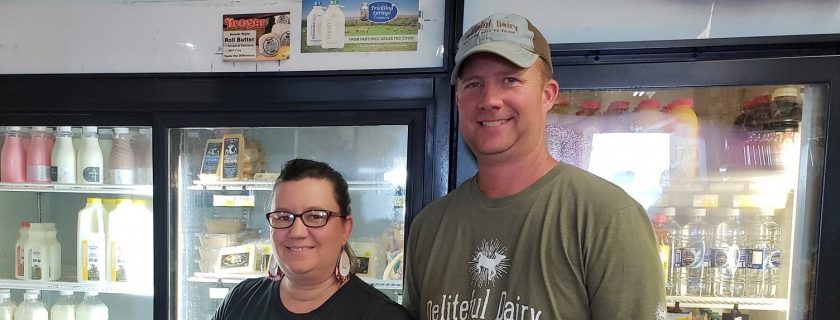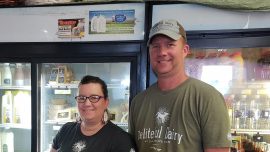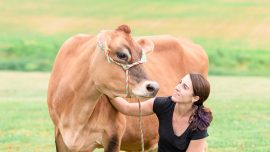By: Devin Doolan
The COVID-19 pandemic has blown Maryland’s dairy industry into uncharted waters, but Brooks Long, a seventh generation dairy farmer in Williamsport, MD, has found success during a time when many local operations are dwindling. He and his wife, Katie, bought their dairy operation in 2009, but it was their decision to begin producing and selling their own milk in 2019 that put them in a position to succeed during the pandemic.
Their store, Deliteful Dairy, has experienced a significant increase in customers since February 2020. “We almost tripled in production,” said Long, detailing how their current processing total of 45,000 gallons of milk a month dwarfs their production at the beginning of this year. Their farm has also increased their capacity for pasteurization from 100 gallons to 300 gallons a month during the same period of time. As a whole, Long says they still only process about 60% of their total cow production, shipping the rest to processing plants in Maryland and Virginia.
Long believes there are three main reasons why Deliteful Dairy has been able to succeed. The primary reason is that restaurants shut down, forcing more people to stay at home and buy staple foods locally rather than going somewhere else to get them. This leads into his second reason, that people wanted to avoid big supermarkets they knew would be overcrowded. The couple offered a relatively remote location compared to supermarkets, and customers responded to that. Finally, some supermarkets were limiting how much milk customers could buy because of limited supply. This was not a problem at Deliteful Dairy. “Customers knew that if they came to us, they were going to be able to get what they wanted,” said Long, “and that makes a difference. Available, quality products make all the difference.”
While they certainly did not see this pandemic coming, the Longs were able to quickly adapt because they had already been producing milk on their farm. Without these production facilities, Long notes, they would have been forced to dump milk like so many other Maryland dairy farmers. Since these facilities weren’t running near capacity before the pandemic, they were able to handle the developing demand once it hit. “We had some 13-hour days,” Long said, looking back on the early months of March and April, “but we had the milk and the extra time to get it done.” Not only did this allow the Longs to meet their retail demand, but they were also able to keep up with a burgeoning wholesale market which needed constant supply.
Very few farms in Maryland were set up to deal with the pandemic like Deliteful Dairy was. The majority of local dairy farmers depend on selling unprocessed milk to co-ops, and the drop in price along with various regulations in the covid assessment really hurt them, according to Long. “This is the straw that broke the camel’s back for a lot of farmers,” said Long, explaining how the local dairy industry has been on a steady decline since prices began to drop in 2015. When it comes down to it, many local farmers had no one to sell to once schools and restaurants shut down, and Long knows that the way their farm is structured helped protect them.









